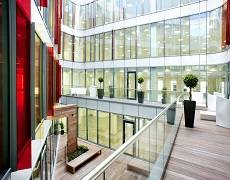September 11, 2013
Research reveals UK’s shrinking workplace space standards and regional disparities
 The latest Occupier Density Study from the British Council for Offices reveals that London and the South East of England have some of the most spacious workplaces in the UK, in spite of the fact that London has the most expensive office space on Earth. The BCO research found that the South West has the highest density at 8.6 sq. m. per workstation while London (11.3 sq. m.) and the South East (12.7 sq. m.) have lower densities than all UK regions apart from Wales (11.4 sq. m.). Yet recent research from Cushman and Wakefield has identified London as the world’s most expensive city to rent office space and a report last week from BNP Paribas revealed the large disparities in total occupancy costs between London and the rest of the UK.
The latest Occupier Density Study from the British Council for Offices reveals that London and the South East of England have some of the most spacious workplaces in the UK, in spite of the fact that London has the most expensive office space on Earth. The BCO research found that the South West has the highest density at 8.6 sq. m. per workstation while London (11.3 sq. m.) and the South East (12.7 sq. m.) have lower densities than all UK regions apart from Wales (11.4 sq. m.). Yet recent research from Cushman and Wakefield has identified London as the world’s most expensive city to rent office space and a report last week from BNP Paribas revealed the large disparities in total occupancy costs between London and the rest of the UK.
























August 30, 2013
Sometimes health and safety failures can be a laughing matter
by Mark Eltringham • Comment, Facilities management, Legal news, Workplace
(more…)